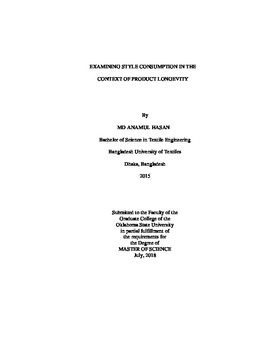| dc.contributor.advisor | Armstrong, Cosette M. | |
| dc.contributor.author | Hasan, Md Anamul | |
| dc.date.accessioned | 2019-03-25T20:05:18Z | |
| dc.date.available | 2019-03-25T20:05:18Z | |
| dc.date.issued | 2018-07-01 | |
| dc.identifier.uri | https://hdl.handle.net/11244/317684 | |
| dc.description.abstract | The importance of extended product lifespan for sustainable clothing consumption has been established by many researchers. However, assuring extended lifespan is difficult since consumers' desire for novelty fuels premature disposal and frequent replacement of clothing products, thereby shortening their lifespan. Therefore, promoting sustainable consumption by extended usage of clothing presents both a unique challenge and an opportunity. Recently, style consumption (SC) has been identified by some researcher in the exploration of sustainable clothing consumption. SC is a type of personal style behavior defined as consistency in style use as opposed to constant change over time. However, theoretical understanding of SC is limited. This study extends the under-researched area of SC by highlighting personal values that characterize individuals' consumption behavior and their style. Consumption behavior was investigated in cases where consumers reported product longevity (utilizing wardrobe for at least ten years). This qualitative study follows means-end theory connecting desired product attributes with personal values. Several personal values such as self-expression, self-respect, achievement, protect planet, and hedonism were identified, suggesting participants' consumption choices are driven by egoistic and biospheric values. Besides, altruistic values were identified at the disposal phase of consumption. However, egoistic values were observed to be more dominant than biospheric and altruistic values. This is because, personal orientation or egoistic concern is central to the consumption motives and values related to personal style. What makes this study significant is that it investigated actual sustainable consumption behavior where consumers report product longevity with their clothing, rather than asking questions about style to those who may marginally adopt sustainable consumption behavior. | |
| dc.format | application/pdf | |
| dc.language | en_US | |
| dc.rights | Copyright is held by the author who has granted the Oklahoma State University Library the non-exclusive right to share this material in its institutional repository. Contact Digital Library Services at lib-dls@okstate.edu or 405-744-9161 for the permission policy on the use, reproduction or distribution of this material. | |
| dc.title | Examining Style Consumption in the Context of Product Longevity | |
| dc.contributor.committeeMember | Clare, Gregory Paul | |
| dc.contributor.committeeMember | Park, Hyejune | |
| osu.filename | Hasan_okstate_0664M_15875.pdf | |
| osu.accesstype | Open Access | |
| dc.description.department | Design, Housing and Merchandising | |
| dc.type.genre | Thesis | |
| dc.type.material | text | |
